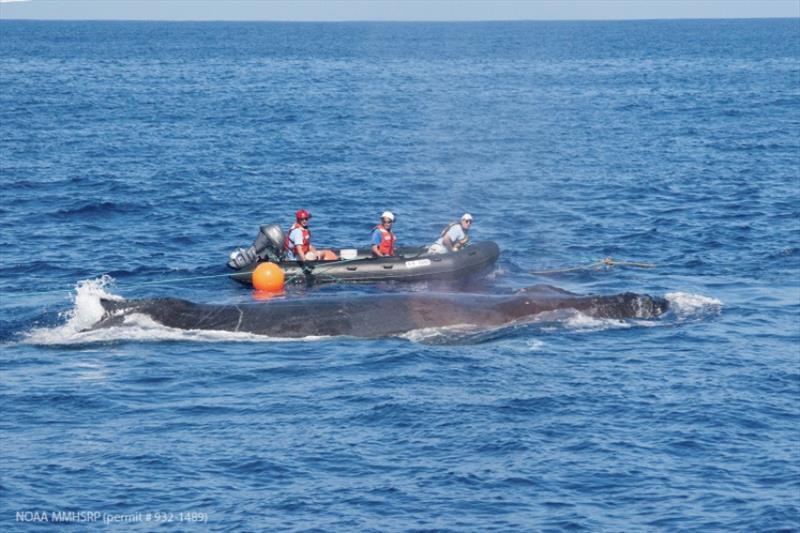
New online course: How on-water community can help free entangled whales in Hawaii
by NOAA Fisheries 16 Jan 2020 13:16 UTC

Trained, well-equipped, and authorized personnel respond to entangled humpback whale © NOAA MMHSRP / HWS
Entanglement in ropes, nets, and other marine debris is a major threat to the humpbacks and other large whales of Hawaii. But attempting to free an entangled, multi-ton whale is inherently dangerous.
Due to the risks to whales and humans alike, only trained, well-equipped responders are authorized to engage in large whale disentanglement efforts.
Most often, however, fishermen, tour boat operators, and whale researchers are the ones to first come across the entangled animals. These "first responders" assist NOAA's Hawaii Marine Mammal Response Network with reporting, monitoring, and assessment efforts.
We recognize this vital assistance and the need to better prepare first responders for the task. So, we teamed up with The Nature Conservancy (TNC) to develop a new online training course that outlines the first responder roles of large whale entanglement responses.
"Commercial and recreational fishermen are an untapped resource who could provide a much broader and stronger foundation for entanglement response networks given the right training," said Tom Dempsey, Oceans Program Director at TNC. "It makes sense to develop a training course for them since they want to be a part of the solution, and they are often onsite when entanglements occur."
Past efforts have shown that authorized response is the best way to help entangled whales. At the same time, it provides valuable information towards reducing the threat of entanglement to whales. Yet, members of the on-water community who come across an entangled whale can—and do—play a vital role in the response. Specifically, they report, collect information, and monitor the whale from a safe and legal distance until trained teams arrive.
By knowing what information to collect, and by taking and sharing photos with the disentanglement team, boaters can help marine mammal responders. With their help, these responders—who have more advanced training, can understand the extent of the entanglement before mounting a response. This enables them to respond with the appropriate gear and strategy.
"Without these efforts in large whale response, we would not be able to save seriously entangled whales, and we would miss opportunities to learn about the impacts of entanglements," said Ann Garrett, Assistant Regional Administrator of the NOAA Fisheries Protected Resources Division in the Pacific Islands. "This allows us to implement management strategies that continue to protect them."
The online course is an introduction to the entanglement response program. It underscores the different levels of expertise required and the safety precautions involved in large whale responses. The module includes information on how to identify whale species, observe their behavior, and assess and document the entanglement through photographs and video.
Much more extensive, in-person training is required to qualify for disentanglement teams. These teams are part of the Large Whale Entanglement Response Network overseen by NOAA Fisheries and NOAA's Hawaiian Islands Humpback Whale National Marine Sanctuary.
TNC provided the computer platform and technical expertise to develop the online course. NOAA Fisheries, the Sanctuary, the Center for Coastal Studies, and other members of the response network provided the course content. It includes information, interviews, photographs, and video of previous entanglements.
View the online training here.